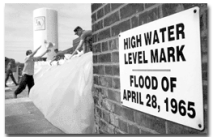
I’ve recently finished a book by Daniel Kahneman, ‘Thinking, Fast and Slow’, that raises interesting ideas about how people think about risk, prepare for disaster and react to a crisis, such as:
Can we as human beings ‘think the unthinkable’ and ‘know the unknowable’?
Apparently not, according to psychology experiments. Studies show that once we have faced a situation, it comes to mind more readily, we can prepare ourselves more effectively, and our responses and decision-making becomes clearer. Scenario-based exercises make us better prepared for future incidents by preparing us for the ‘unimaginable’ so that when the worst really does happen, we can perform at our best.
The concept behind this is the “availability heuristic”, which is the idea that if a situation is ‘available’ (i.e. we’ve been exposed to/experienced it many times), the more important — and the more possible — it is deemed to be. According to Daniel Kahneman, the heuristic directly influences how people perceive risk, and plan for disasters or crises.
He writes:
“Societies have always tracked the high-water mark of rivers that periodically flood — and have always prepared accordingly, apparently assuming that floods will not rise higher than the existing high-water mark. Images of worse disasters do not easily come to mind.”
In other words, people only prepare for the worst-case scenario that easily comes to mind – that which they have experienced in the past. So how do we teach people to raise the metaphorical watermark to prepare for those things they haven’t yet experienced? We use immersive simulation exercises to force people to ‘think the unthinkable’ and ask them to work through a scenario that they have never considered before — for when the river floods the entire city.
Simulation exercises must be realistic, complex and dynamic; crisis management teams (CMT) should be pushed out of their comfort zones and immersed into a temporary world where they experience significant levels of pressure, stress, risk and uncertainty. Exposure fosters expertise, and there is no better way to develop the non-technical skills required for crisis response and to prepare teams to face the ‘unthinkable’ and make decisions in the face of the ‘unknowable’.
This idea is explored further in my white paper on High Fidelity Simulation Exercises for Training Strategic Crisis Management, which won the Business Continuity and Resilience Journal’s Business Continuity Paper of the Year for 2012.
This article originally appeared on Steelhenge Crisis Thinking and has been republished with permission.
Find out how to syndicate your content with Business 2 Community.
Open all references in tabs: [1 - 7]